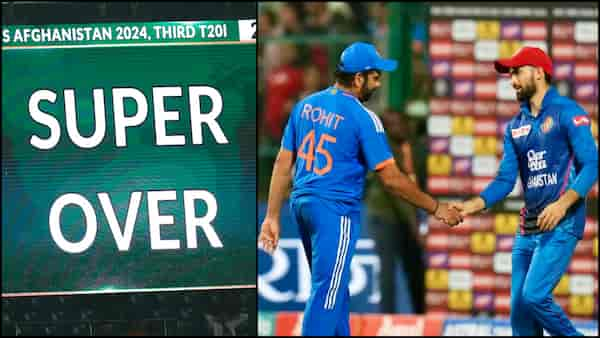IND vs AFG - Retired out or Retired not out? Controversy behind Rohit Sharma's 1st Super Over decision and here's what we know
Rohit Sharma's reappearance to bat in the second Super Over raised concerns about the rules during the 3rd T20I between India and Afghanistan.

Rohit Sharma's 1st Super Over decision gets fans talking
Last Updated: 01.08 PM, Jan 18, 2024
The third and final encounter between India and Afghanistan concluded with the game ending after two Super Overs were played, resulting in the Men in Blue securing victory and winning the three-match series 3-0. However, a controversy arose after Indian skipper Rohit Sharma's decision in the first Super Over, which has been questioned by the opposition and many others — was he retired out or retired not out? This issue arises from his subsequent appearance at bat during the second Super Over.
ALSO READ | IND vs AFG - After top order collapse, Rohit Sharma reaches 50, Rinku Singh starts smashing boundaries
Rohit Sharma's reappearance to bat in the second Super Over raised concerns about the rules and playing conditions because the Indian skipper had substituted himself during the first Super Over but reappeared to bat in the second.
According to the ICC's playing conditions for Men's T20Is, "Any batsman dismissed in any previous Super Over shall be ineligible to bat in any subsequent Super Over."
India's chase of 17 runs was reduced to just 2 off 1 ball by the captain and Yashasvi Jaiswal, when the former replaced himself with Rinku Singh, with the idea that Singh would be quicker to take runs between the wickets. However, there was no confirmation whether Rohit was 'retired out' or 'retired not out.'
If he was 'retired out,' he would have been ineligible to bat again in the second Super Over. However, he was seen walking out to bat again in the second Super Over and went on to score 11 runs (a six, a four, and a single) before the Men in Blue lost two wickets.
In the case of 'retired not out,' Clause 25.4.2 of the ICC playing conditions for men's T20Is states: "If a batsman retires because of illness, injury, or any other unavoidable cause, that batsman is entitled to resume his innings. If, for any reason, this does not happen, that batsman is to be recorded as 'Retired - not out.'"
"If a batsman retires for any reason other than as in clause 25.4.2, the innings of that batsman may be resumed only with the consent of the opposing captain."
Considering these two scenarios, Rohit's re-entry in the second Super Over should have come with the consent of Afghan captain Ibrahim Zadran. However, according to coach Jonathan Trott, he stated at the post-match press conference that there was no clarity about the same.
"I have no idea," Trott said when asked if the officials consulted them regarding the situation. "Has there ever been two Super Overs? That's what I am trying to say. It's sort of like a new...we keep setting these new sort of rules. What I am trying to say is we kept testing the rules, we kept testing the guidelines."
"It was not communicated," Trott said, but this time he spoke about the situation his team faced with the ball. According to the playing conditions, even a bowler who had already bowled in one Super Over is ineligible to bowl in subsequent ones. This meant Afghanistan couldn't give the ball to Azmatullah Omarzai and went with Fareed Ahmad instead.
ALSO READ | IND vs AFG - Chinnaswamy stadium goes quite as 4 wickets fall, Virat Kohli, Sanju Samson go for ducks
"We wanted Azmat to bowl the second over again; Fareed bowled a great over. But those sorts of things will be explained...because it has happened, these things will be explained and done in writing in the future. If those are the rules, that's great. I just think we had a good game, and I don't think that should be the talking point," Trott added.
Addressing Rohit's decision, Indian head coach Rahul Dravid said, "Taking himself out was Ashwin-level thinking," adding more confusion regarding the decision that was made.

 Premium
Premium